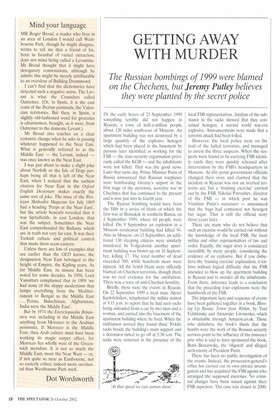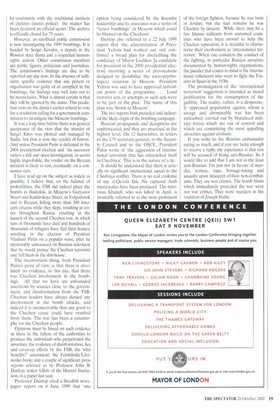GETTING AWAY WITH MURDER
The Russian bombings of 1999 were blamed
on the Chechens, but Jeremy Pulley believes
they were planted by the secret police
IN the early hours of 23 September 1999 something terrible did not happen in Ryazan, a town of half-a-million people about 120 miles south-east of Moscow. An apartment building was not destroyed by a large quantity of the explosive hexogen which had been placed in the basement by persons later identified as working for the FSB — the state-security organisation previously called the KGB — and the inhabitants were not killed. That was the good news. Later that same day. Prime Minister Putin of Russia announced that Russian warplanes were bombarding Grozny's airport in the first stage of the atrocious, secretive war in Chechnya that has continued to the present and is now just into its fourth year.
The Ryazan bombing would have been the fifth in a series of blasts of which the first was at Buinaksk in southern Russia on 4 September 1999, where 64 people were killed. On 9 September an explosion in a Moscow residential building had killed 94. Also in Moscow, on 13 September, an additional 130 sleeping citizens were similarly murdered. In Volgodonsk another apartment building was blown up on 16 September, killing 17. The total number of dead exceeded 300. while hundreds more were injured. All the bomb blasts were officially blamed on Chechen terrorists, though there was no real evidence for the attribution. There was a wave of anti-Chechen hostility.
Briefly, these were the events in Ryazan. On 22 September 1999 a local man, Alexei Kartofelnikov, telephoned the militia station at 9.15 p.m. to report that he had seen sacks being unloaded from a car by two men and a woman, and carried into the basement of the apartment building where he lived. When the militiamen arrived they found three 50-kilo sacks beside the building's main support and a detonator timed to go off at 5.30 a.m. The sacks were removed in the presence of the local FSB representatives. Analysis of the substance in the sacks showed that they contained hexogen, a second world war-era explosive. Announcements were made that a terrorist attack had been foiled.
However, the local police were on the trail of the failed terrorists, and managed to arrest the three suspects. When the suspects were found to be carrying FSB identity cards they were quickly released after intervention by the FSB's headquarters in Moscow. At this point government officials changed their story and claimed that the incident in Ryazan was not an averted terrorist act, but a 'training exercise' carried out by the FSB. Nikolai Patrushev, director of the FSB — in which post he was Vladimir Putin's successor — announced that the bags had contained not hexogen but sugar. That is still the official story three years later.
There are many who do not believe that such an exercise would be carried out without the knowledge of the local FSB, the local militia and other representatives of law and order. Equally, the sugar story is considered incredible by many people, considering the evidence of an explosive. But if you disbelieve the 'training exercise' explanation, it follows without logical difficulty that the FSB intended to blow up the apartment building in Ryazan and to murder all the inhabitants. From there, inference leads to a conclusion that the preceding four explosions were the handiwork of the FSB.
The important facts and sequence of events have been gathered together in a book, Blowing Up Russia: Tenor from Within, by Yuri Felshtinsky and Alexander Litvinenko, which is obtainable through Amazon.co.uk. Those who disbelieve the book's thesis that the bombs were the work of the Russian security services point to the influence of the eminence grise who is said to have sponsored the book, Boris Berezovsky, the 'oligarch and alleged arch-enemy of President Putin.
There has been no public investigation of the events. Instead, the prosecutor-general's office has carried out its own private investigation and has acquitted the FSB agents who arranged the supposed exercises. No criminal charges have been issued against their FSB superiors. The case was closed in 2000. In conformity with the traditional instincts of chekists (secret police) the matter has been declared an official secret. The archive is officially closed for 75 years.
However, an unofficial public commission is now investigating the 1999 bombings. It is headed by Sergei Kovalev, a deputy in the Russian state duma and a respected humanrights activist. Other commission members are public figures, politicians and journalists. The commission's findings are due to be reported any day now. In the absence of sufficient, specific evidence that any person or organisation was guilty of or complicit in the bombings, the findings may well turn out to be inconclusive. What is almost certain is that they will be ignored by the duma. This prediction rests on the duma's earlier refusal to vote for a resolution calling for a government commission to investigate the Moscow bombings.
It was a long time before there was general acceptance of the view that the murder of Sergei Kirov was plotted and managed by Stalin, but that is now the verdict of history. And unless President Putin is defeated in the 2004 presidential election and his successor orders a full and open investigation, as seems highly improbable, the verdict on the Ryazan incident is likely to rest, eventually, on a consensus view.
I have read up on the subject as widely as possible. I believe that, on the balance of probabilities, the FSB did indeed place the bombs in Buinaksk, in Moscow's Guryanov Street and Kashirskoye Street, in Volgodonsk and in Ryazan, killing more than 300 innocent citizens while they slept, resulting in terror throughout Russia; resulting in the launch of the second Chechen war, in which tens of thousands have died and hundreds of thousands of refugees have fled their homes; resulting in the election of President Vladimir Putin on a popular wave, after he memorably announced on Russian television that he would pursue the Chechen terrorists and 'kill them in the shit-house'.
The inconvenient thing, from President Putin's point of view, is that there is absolutely no evidence, to this day, that there was Chechen involvement in the bombings. All that we have are unfounded assertions by sources close to the government, and disinformation from the FSB. Chechen leaders have always denied any involvement in the bomb attacks, and indeed it is inconceivable that any good to the Chechen cause could have resulted from them. The war has been a catastrophe for the Chechen people.
Opinions must be based on such evidence as there is: the failure of the authorities to produce the individuals who perpetrated the atrocities; the evidence of disinformation, lies and cover-up efforts by the FSB; the who benefits?' assessment; the Felshtinsky/LiNinenko book; and a couple of significant press reports referred to by Professor John B. Dunlop, senior fellow of the Hoover Institution, in a paper last year.
Professor Dunlop cited a Swedish newspaper report on 6 June 1999 that 'one option being considered by the Kremlin leadership and its associates was a series of "terror bombings" in Moscow which could be blamed on the Chechens'.
Dunlop also referred to a 22 July 1999 report that 'the administration of President Yeltsin had worked out and confirmed a broad plan for discrediting the candidacy of Mayor Luzhkov [a candidate for president in the 2000 presidential election] involving a series of provocations designed to destabilise the socio-psychological situation in Moscow. President Yeltsin was said to have approved individual points of the programme. . . Loud terrorist acts or attempts at such acts were to be part of the plan.' The name of this plan was 'Storm in Moscow'.
The two reports both preceded and indicated the likely origin of the bombing campaign.
Russian propaganda and deceptions are sophisticated, and they are practised at the highest level. On 12 September, in letters to the UN secretary-general, to the Security Council and to the OSCE, President Putin wrote of 'the aggression of international terrorism that has entrenched itself in Chechnya'. This is in the nature of a lie.
It should be understood that there is actually no significant international aspect to the Chechnya conflict. There is no real evidence of any al-Qa'eda link. No captured Arab mercenaries have been produced. The notorious Khattab, who was killed in April, is invariably referred to as the most prominent of the foreign fighters, because he was born in Jordan, but the fact remains he was Chechen by descent. While there may be a few Islamic militants from unnamed countries who have been moved to help the Chechen separatists, it is deceitful to characterise their involvement as 'international terrorism'. When one considers the conduct of the fighting, in particular Russian atrocities documented by human-rights organisations, the parallel that comes to mind is the international volunteers who went to fight the Fascists in Spain in the 1930s.
The promulgation of the 'international terrorism' suggestion is intended as moral justification for the consumption of the gullible. The reality, rather, is a desperately oppressed population against whom a savage and abominable war has been unleashed, carried out by brutalised military forces which are out of control and which are committing the most appalling atrocities against civilians.
If you write to the Russian ambassador saying as much, and if you are lucky enough to receive a reply, my experience is that you will be accused of being anti-Russian. So I would like to add that I am not in the least anti-Russian, I'm just not in favour of murder, torture, rape, hostage-taking and assaults upon innocent civilian non-combatants. They are war crimes. The bomb blasts which immediately preceded the war were not war crimes. They were murders in the tradition of Joseph Stalin.



















































































 Previous page
Previous page